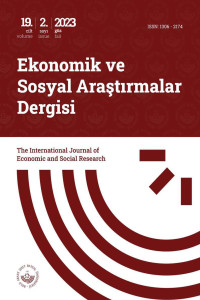Öz
The main purpose of this study is to investigate through which channels the effects of monetary policy implementations (instruments) are transferred to the real sectors of the economy and in what way and at what rate the real sectors are affected when a monetary policy shock occurs in the economy. Although there are many studies in the literature on the effect of monetary policy on macroeconomic variables, there are limited studies on the inter-sectoral differences of the monetary policy effect, the size of this difference and its main reasons. No similar study has been found in Turkey that analyzes all 4 channels of the monetary transmission mechanism on sectors at the same time. Studies that analyze the sectors are generally analyzed over the industrial sector and by ignoring the expectation channel. In this study, unlike the literature, using monthly data for the period 2011:01-2019:12, the effect of the monetary transmission mechanism's expectation, interest, loan and exchange rate channels on the industry, service and construction sectors was examined with the VAR (Vector Autoregressive) method. In this respect, it is expected that the study will contribute to the literature. The first of the findings obtained from the study is that the effectiveness of monetary transmission mechanism channels differs according to sectors. The second finding is that it operates in four channels in the industry sector, the credit and exchange rate channel in the service sector, and the expectation and exchange rate channel in the construction sector. In addition, among the four monetary transmission channels in three sectors, only the exchange rate channel works, so it is seen that the channel that has the most impact on the real economy is the exchange rate channel.
Anahtar Kelimeler
Monetary Policy Interest Rate Exchange Rate Credit Volume Expectation Real Sector VAR Method
Proje Numarası
2022SOBE002
Kaynakça
- Aklan, N. ve Nargeleçekenler, M. (2008), Para Politikalarının Banka Kredi Kanalı Üzerindeki Etkileri, İstanbul Üniversitesi Siyasal Bilgiler Fakültesi Dergisi, (39), 109-132.
- Alam, T. ve Waheed, M. (2006), Sectoral Effects of Monetary Policy: Evidence from Pakistan, The Pakistan Development Review, 45(4), 1103-1115.
- Arnold, I. J.M. ve Vrught, E.B. (2002), Regional Effects of Monetary Policy in the Netherlands, International Journal of Business and Economics, 1(2), 123-134.
- Arslan, B.G. ve Ergeç, E.H. (2011), Türkiye Ekonomisinde Para Politikasının Sektörel Etkileri, Anadolu Üniversitesi Sosyal Bilimler Dergisi, 11(1), 89–103.
- Bai, J., Carvalho, D. ve Phillips, G. M. (2018), The impact of bank credit on labor reallocation and aggregate industry productivity, The Journal of Finance, 73(6), 2787-2836.
Öz
Bu çalışmanın temel amacı Türkiye’de para politikası uygulamalarının (araçlarının) etkisinin hangi kanallardan ekonominin reel sektörlerine aktarıldığını ve ekonomide bir para politikası şoku meydana geldiğinde reel sektörlerin ne yönde ve oranda bu şoktan etkilendiğini araştırmaktır. Literatürde para politikasının makroekonomik değişkenler üzerindeki etkisini konu alan birçok çalışma bulunmakla birlikte para politikası etkisinin sektörler arası farklılığı, bu farklılığın büyüklüğü ve temel nedenlerini konu alan sınırlı sayıda çalışma mevcuttur. Türkiye’de parasal aktarım mekanizmasının 4 kanalının da aynı anda sektörler üzerinde analiz eden benzer bir çalışmaya rastlanmamıştır. Sektörleri analiz eden çalışmalar genellikle sanayi sektörü üzerinden ve beklenti kanalı ihmal edilerek analiz edilmiştir. Bu çalışmada literatürden farklı olarak 2011:01-2019:12 dönemine ait aylık veriler kullanarak, parasal aktarım mekanizmasının beklenti, faiz, kredi ve döviz kuru kanallarının sanayi, hizmet ve inşaat sektörü üzerindeki etkisin VAR (Vektör Otoregresif) yöntemi ile incelenmiştir. Bu yönüyle çalışmanın literatüre katkı yapması beklenmektedir. Çalışmadan elde edilen bulgulardan ilki parasal aktarım mekanizması kanallarının etkinliğinin sektörlere göre farklılık gösterdiğidir. İkinci bulgu sanayi sektöründe dört kanalında işlediği, hizmet sektöründe kredi ve döviz kuru, inşaat sektöründe ise beklenti ve döviz kuru kanalının işlediği yönündedir. Ayrıca üç sektörde dört parasal aktarım kanallarından ortak olarak yalnızca döviz kuru kanalının çalıştığı dolayısıyla reel ekonomiye en fazla etki eden kanalın döviz kuru kanalı olduğu görülmüştür.
Anahtar Kelimeler
Para Politikası Faiz Döviz Kuru Kredi Hacmi Beklenti Reel Sektör VAR Yöntemi
Destekleyen Kurum
Pamukkale Üniversitesi
Proje Numarası
2022SOBE002
Kaynakça
- Aklan, N. ve Nargeleçekenler, M. (2008), Para Politikalarının Banka Kredi Kanalı Üzerindeki Etkileri, İstanbul Üniversitesi Siyasal Bilgiler Fakültesi Dergisi, (39), 109-132.
- Alam, T. ve Waheed, M. (2006), Sectoral Effects of Monetary Policy: Evidence from Pakistan, The Pakistan Development Review, 45(4), 1103-1115.
- Arnold, I. J.M. ve Vrught, E.B. (2002), Regional Effects of Monetary Policy in the Netherlands, International Journal of Business and Economics, 1(2), 123-134.
- Arslan, B.G. ve Ergeç, E.H. (2011), Türkiye Ekonomisinde Para Politikasının Sektörel Etkileri, Anadolu Üniversitesi Sosyal Bilimler Dergisi, 11(1), 89–103.
- Bai, J., Carvalho, D. ve Phillips, G. M. (2018), The impact of bank credit on labor reallocation and aggregate industry productivity, The Journal of Finance, 73(6), 2787-2836.
Ayrıntılar
| Birincil Dil | Türkçe |
|---|---|
| Konular | Ekonomi |
| Bölüm | Makaleler |
| Yazarlar | |
| Proje Numarası | 2022SOBE002 |
| Erken Görünüm Tarihi | 28 Aralık 2023 |
| Yayımlanma Tarihi | 29 Aralık 2023 |
| Kabul Tarihi | 23 Ağustos 2023 |
| Yayımlandığı Sayı | Yıl 2023 Cilt: 19 Sayı: 2 |
İletişim Adresi: Bolu Abant İzzet Baysal Üniversitesi İktisadi ve İdari Bilimler Fakültesi Ekonomik ve Sosyal Araştırmalar Dergisi 14030 Gölköy-BOLU
Tel: 0 374 254 10 00 / 14 86 Faks: 0 374 253 45 21 E-posta: iibfdergi@ibu.edu.tr
ISSN (Basılı) : 1306-2174 ISSN (Elektronik) : 1306-3553

